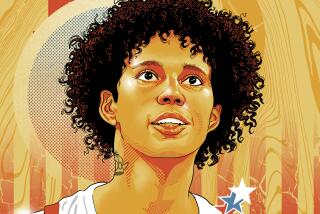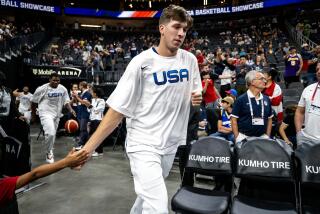A Once-in-a-Lifetime Journey : Basketball Was Secondary on Sweetwater High’s Trip Abroad
- Share via
SAN DIEGO — “Homekeeping youth have ever homely wits
I would rather entreat thy company
To see the wonders of the world abroad
Than living dully sluggardized at home.”
--William Shakespeare
It is certain Shakespeare didn’t have Gary Zarecky’s globetrotting Sweetwater High School boys basketball team in mind when he penned the above prose for his play “Two Gentlemen of Verona.” Nevertheless, the advice contained therein was taken to heart by the team, which journeyed to Yugoslavia and France for 15 days over the holidays.
The National City school’s 12 players and assorted coaches, wives and managers spent Christmas in Belgrade, the capital of Yugoslavia. They were alone for the most part in their observance of the holiday because Yugoslavia is largely an atheist nation.
New Year’s Eve found the group in Paris, the capital of romance. There, the Americans were able to witness first-hand how the French ring in the New Year.
It was no easy task keeping Zarecky’s boisterous charges in line for the duration, possessed as they were with the natural restiveness that is the trademark of youth. It was a group of curious adolescents eager to explore and have a good time--a rollicking, rough-and-tumble group of all-American boys getting their first chance to swagger about in a whole ‘nother world.
It was a once-in-a-lifetime trip for guys such as Mahlon Williams, Jesse Aguirre and Sean Styles--avowed gym rats who’ve spent most of their youth arching jumpshots, shagging stray free throws, and practicing their alley-oops and layups on the playgrounds and gyms of the South Bay.
It was a chance to represent their country, mom, apple pie . . . Chevrolets.
They carried with them written greetings from President Reagan and Gov. Deukmejian to be presented to the mayor of Belgrade. They shared the dais with Yugoslav Olympic teams, paid their respects at the majestic grave of Yugoslavia’s former President Josip Tito, a national hero. In Paris, they visited the Louvre, the Arc de Triomphe and the Eiffel Tower.
And, in between, they showed the Yugoslavs how to play basketball, American style.
Although the United States is thousands of miles away from Yugoslavia, some things seem to be universal in the basketball world. Over there, for instance, coaches don’t make much money either.
Sweetwater’s host was Ranko Zeravica, the 55-year-old former coach of Yugoslavia’s Olympic basketball team. Zeravica coached the Yugoslavs to a gold medal at Moscow in 1980, a silver at Montreal in 1976, and a bronze at Munich in 1972.
“He’s the John Wooden of Europe,” Zarecky said.
Yet, for his efforts during that time he was paid the equivalent of $500 a month.
The drive to win also is universal. And so recruiting--a practice outlawed at U.S. high schools--is rampant and furiously competitive among the age-group club teams in Yugoslavia. Basketball is not an organized high school sport, but it is common for a player to jump from one club team to another over the course of a career.
The home-court advantage is another constant, as the Americans discovered during their second game, which was played against KK Crezena, the defending junior national champions of Yugoslavia. The team featured an imposing 6-8, 6-10, 6-9 front line and was 26-1 heading into the game.
According to Zarecky, before they knew it, the Red Devils were down by 26 points in that game. However, by rallying around a furious, effective full-court press they came back. Players on the bench were cheering on their teammates with cries of “Dee-fense, Dee-fense” and “USA, USA, USA . . . “
Suddenly, according to Zarecky, Sweetwater players started getting called for “ticky-tack” fouls, ones that weren’t called during the first 30 minutes. Curiously, although the Yugoslavs continued relentlessly with their own physical style of play, Zarecky said, they drew no whistles.
Quicker than one could whisper “Tito Lives,” four Red Devils fouled out in a little more than a minute, and the Yugoslavs prevailed, 94-89. After that experience, the Sweetwater players kept their cheers to themselves.
Overall, the Red Devils went 4-1 and finished second in the Belgrade Tournament.
What follows is a series of glimpses into the human side of the trip as told by Zarecky and other members of the Sweetwater entourage:
Christmas in Belgrade was a strange, almost depressing affair since the Americans were almost the only people observing the holiday. One of the team managers, Abner Vasquez, helped players draw each others’ names and exchange gifts.
The group’s charismatic tour guide, Zeka, somehow found a Christmas tree in an effort to make them feel at home. But being in a strange country at Christmas time was too much for two young women who came along. Cheerleader Tiffany Ciprano and friend Margaret Martinez broke into tears on Christmas Eve.
Although the Yugoslavs were pleasant off the court, treating the Americans with courtesy and good will, on the court they were all business. The Americans had to learn to adjust from the U.S. style of play, which is predicated more on finesse and grace, to the physical European style.
Sean Styles, a sophomore, is a friendly, easy-going, yet quiet type. He recalls he tried several times during the course of a game to give opposing players a handshake or a pat on the back after a good play or an entanglement. His gestures weren’t acknowledged. After a while, he quit trying.
Breakdancing is a relatively new phenomenon in Yugoslavia. The locals are fascinated by it, and they tried repeatedly to coax the Americans into a demonstration. Finally, toward the end of the trip in a town on the Adriatic Sea called Split, the Americans delivered.
At night in a little park that seemed deserted, three players--Mahlon Williams, Howard Scott and Terry Wright--began putting on an extemporaneous show. Almost immediately, they were surrounded by a crowd of about 300 people. From a distance it looked like the outskirts of a rock concert, with bystanders eager for a glimpse of the Americans.
Olympic pin collecting, a fad that grew out of the 1984 Summer Games in Los Angeles, reached new heights in Yugoslavia. Zarecky, an avid collector, pursued different designs with the same single-mindedness with which he pursues basketball victories. Pins from the U.S.-boycotted Moscow games in 1980 were especially in demand. He returned with hundreds.
Assistant Coach Frank Chenelle, also an avid collector, and other players and coaches soon got involved in the craze as well.
Zarecky got so caught up in the pin-mania that he paid Styles $20 for seven pins that cost the youngster only 30 cents apiece. The more zealous pin collectors took to leaping off the buses ahead of everyone else upon arrival at new towns or shopping centers to get a jump on the others.
Murmurs and grumblings from late-night pin-trading sessions echoed through the hotel halls. In fact, Zarecky swears the highlight of his trip was the pin-collecting.
In Titovquzice, for the third game, the Yugoslavs managed to get an American flag from who knows where. It was to be the first and only American flag the team would see during their stay.
Gazing with pride at Old Glory, all 40 square feet of it hanging as it did opposite their bench next to Yugoslavia’s national flag, the players were instilled with a sense of patriotism, even though the flag was a bit dated.
It had only 48 stars.
Upon the team’s departure for France, tears were shed in Zagreb for Zeka, the personable tour guide who ushered the party through Yugoslavia for almost two weeks and became a part of the Red Devils’ traveling family.
Some small solace was gained through the promise of continued contact through correspondence.
Paris proved to be a sort of culture shock after the days in Yugoslavia. The French were not as impressed with the Americans as the Yugoslavs were.
At a posh hotel in Paris, Styles and Williams sent out some laundry to be washed by the hotel service. To their chagrin, laundry that cost a $1 or $2 to be done in Yugoslav, cost almost $100 in France.
At the Louvre in Paris, the party was awestruck, gazing in silent wonder at works of art such as the Mona Lisa and Venus de Milo. The breathtaking beauty of priceless collections from around the world left most of them speechless.
One player finally turned to Zarecky and said, “You know what, Coach Z? This is sure some b-a-d pad.”
But, like the rest of the trip, it was bad in the good sense, in a way none of them ever will forget.
More to Read
Get our high school sports newsletter
Prep Rally is devoted to the SoCal high school sports experience, bringing you scores, stories and a behind-the-scenes look at what makes prep sports so popular.
You may occasionally receive promotional content from the Los Angeles Times.






